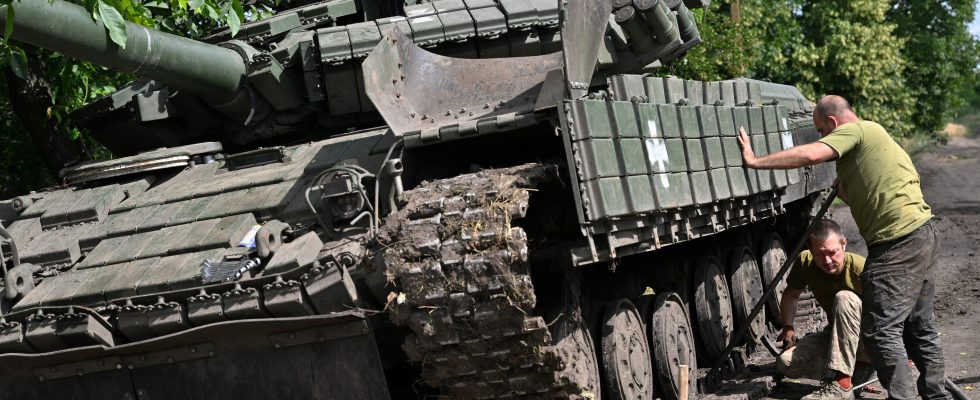The Ukrainian president ordered, Friday, June 30, the reinforcement of the security of the border with Belarus, in the face of the arrival of Wagner’s fighters. “By decision of the General Staff, Commander-in-Chief (Valery) Zaluzhny and General (Sergiy) Nayev were ordered to strengthen the northern leadership in order to secure peace,” Volodymyr Zelensky said in a video released. on Telegram.
After his abortive revolt in Russia a week ago, the boss of the Russian paramilitary group Wagner agreed to go into exile in Belarus thanks to mediation led by President Alexander Lukashenko, an ally of Moscow. According to this agreement, Wagner’s fighters have the choice of going to Belarus – which has apparently been the case for at least 8,000 mercenaries out of the estimated 25,000 in the group -, to engage in the regular Russian army or to return to civilian life. The Russian Ministry of Defense must recover their heavy weapons.
Alexander Lukashenko has estimated that the Belarusian army will benefit from the “experience” of Wagner’s commanders, although he also minimized the activities that the group will be authorized to carry out in the country. Ukraine has repeatedly said it fears an attack from Belarus, which is home to Russian troops but whose own soldiers are not directly involved in the invasion launched by Moscow.
CIA chief’s secret trip to Ukraine
CIA Director William Burns recently visited Ukraine where he met with intelligence officials and President Volodymyr Zelensky, a US official confirmed on Friday (June 30). This trip, which was not made public at the time it was made (in June, before Wagner’s failed rebellion, according to the washington post), took place as Ukrainian forces continued their counter-offensive launched in June in the east and south of the country against Russian forces.
On this occasion, William Burns reaffirmed “the American commitment to sharing intelligence to help Ukraine defend itself against Russian aggression,” the American official told AFP, on condition of anonymity. According to the washington postthe first to report on the trip, Ukrainian leaders outlined plans to retake territories occupied by Russian forces and begin ceasefire negotiations by the end of the year.
In Russia, news sites linked to Wagner’s boss blocked
Information portals belonging to the Patriot media group, close to the boss of the Russian paramilitary group Wagner, Evgueni Prigojine, were blocked on Friday June 30 by the Russian telecoms policeman. Several Russian political and economic news sites, including Ria Fan, all linked to the group of Yevgueni Prigojine, were inaccessible from Russia, noted AFP journalists. Their Internet addresses appear in the “restricted access” register of Roskomnadzor, the government agency responsible for blocking illegal and extremist content, as well as media and other resources banned by the authorities.
Other media linked to the Patriot group, Nevskie Novosti And Ekonomika Segodnia, announced that they were ceasing operations, according to their respective Telegram channels. It should be noted that beyond Wagner, Evgueni Prigojine was involved in many other activities such as the media and the restoration. He was until May at the head of the board of directors of the Patriot media group, created in 2019, and then vice-chairman of its board of directors, according to Russian media.
Wagner’s future in Africa will depend on the “countries concerned”, according to Sergei Lavrov
The future of the presence in Africa of the paramilitary group Wagner will depend on the “countries concerned”, said Friday, June 30 the head of Russian diplomacy Sergei Lavrov, at a time when Western pressure is increasing. “The fate of these arrangements between African countries and the Wagner Group is primarily a matter of the decision of the governments of the countries concerned whether or not to continue this form of cooperation,” Sergei Lavrov told an online briefing.
The future of Wagner, who fought in Ukraine and whose presence has been attested in several African countries but also in Syria, is in question after the 24-hour rebellion led in Russia by his boss, Evgueni Prigojine. The Central African Republic, the main African country where Wagner is based, said on Monday that Russia will continue to operate there, with or without the paramilitary group. France for its part called on Wednesday all the countries involved to dissociate itself from Wagner and said it was ready to impose additional sanctions for the crimes that this group is accused of committing in its theaters of operations. The group’s activities will also be targeted by new American sanctions, particularly in the Central African Republic, according to Washington.
Kazakhstan denounces attempts to recruit its citizens into the Russian army
Kazakhstan has recognized for the first time attempts to enlist its citizens in the Russian army to fight in Ukraine, a sensitive subject in this Central Asian country allied with Moscow but wishing to remain neutral in this war. “We have observed in our region attempts to recruit the local population to the Russian Federation to participate in the armed conflict in Ukraine,” the prosecutor of the Kostanai region (north) said in a statement Thursday evening.
This huge region, whose area is equal to a third of France, borders Russia and more than 40% of the approximately 880,000 inhabitants are of Russian origin. Kazakh authorities have repeatedly urged their citizens not to fight in Ukraine, as the Russian military tries to lure recruits to make up for its losses, promising various benefits. The Kostanai prosecutor also pointed to calls for separatism, generally pro-Russian, by some Kazakh citizens. Migrants from the former Soviet republics of Central Asia and living in Russia, economically destitute, far from their country of origin and generally Russian-speaking, have thus become prime targets.
